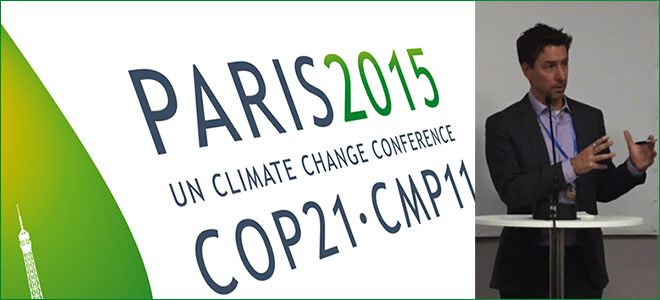The 2015 Paris Climate Conference (also known as COP21: the 21st meeting of the conference of parties) is well underway and several of CIRES colleagues are there. CIRES Communication team reached out to CSTPR’s Max Boykoff; below is a short Q&A with him about his experience so far.
On December 3, May Boykoff participated in a ongoing discussion on how to improve the IPCC’s communication with key stakeholders. Several research groups have assessed the communication of the AR5: how it was framed, how it was reported by the media and how it was used in policy formation. This event presents key finding and advice followed by a panel discussion on how to improve the communication of climate science and climate assessments. More information.
Q) What’s the general mood there?
There’s a great deal of anticipation but also something of a reflective and sober mood. The rhetoric from world leaders, who were here at the opening of the conference, is about the enormity of the challenge. But having heads of state here at the very start has really set a productive tone for the rest of COP21. Honestly, though, there’s so much going on here that no one person could give an omnipotent view of what’s happening. The scale of this event is huge.
Q) You’ve been to four other COPs; how is this different from the others?
It’s different because of the discussions about how big a challenge this is. And in the early days of the other ones, I didn’t sense such a high level of energy. I find both of those to be encouraging signs.
There’s a noted absence of protests because of the attacks a few weeks ago but, in strolling around at the Place de la Republique, I saw people out and about, skateboarders. There’s a sense that life is going on.
Q) You’re speaking on a panel of experts discussing IPCC communications; tell us more about that.
I participated in a research project at the University of Exeter and the University of Bath, looking at how the 5th IPCC Assessment report was handled in the media. So, narrowly, I’m here to represent our group and talk about those findings, as well as put them in the context of the work I’ve done on communicating science policy and findings.
I’m also going to talk about the changes that need to be made in how these issues are communicated. The IPCC has done a great job since 1990 of talking the science of climate change. It’s moved the discussion forward, but only so far. Now the IPCC needs to find ways of communicating with the public by taking into account how to tell human stories and relate what’s happening in ways that people can understand, make that information more accessible to someone who doesn’t necessarily have a science background. Some of that responsibility falls on journalists, but it also fall on scientists as communicators
Q) Is there anything in particular that people are talking about?
It’s hard to say; there’s a lot going on here. But in the mix of things I’ve been hearing—in side events and press accounts—is this notion of loss and damage. That was alluded to at the beginning of these talks and is important to small island developing nations who are really affected by climate change. It raises concerns about liability and so the question of whether this language about loss and damage will be included in the outcome is a big one.


